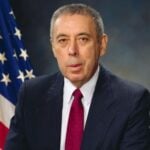Space Foundation News
Combatant Command Panel Talks About Diverse Space Applications
Written by: developer
COLORADO SPRINGS, Colo. (Nov. 3, 2009) — The opening speakers at this week’s Strategic Space Symposium discussed – from multiple perspectives – how critical space is to the nation’s defense and how important space is to a much broader range of endeavors, including natural resource management, policing drug trafficking, monitoring space debris, and keeping businesses running throughout the world.
Following Gen. Chilton’s remarks (see related article), the Combatant Command Panel (Joint Operations: Space as a Force Multiplier) panel, moderated by Vice Adm. Carl Mauney, USN, deputy commander, United States Strategic Command (pictured), offered perspectives from multiple combatant commands on the space-related challenges, solutions, and opportunities that enhance – or hinder – their operations. The panel members, each representing a different combatant command, talked about how they rely upon space assets to accomplish their missions.
Lt. Gen. Francis Kearney, III, USA, deputy commander, United States Special Operations Command, spoke about the importance of space to the warfighter, saying that the soldier on the battlefield is the number one customer of space support. He went on to outline what he sees as major challenges: acquiring the signal in difficult-to-reach areas, such as dense urban areas or triple-canopy jungles; accuracy of geolocation to make sure targets and threats are accurately pinpointed; and an environment where the speed of data often outpaces speed of decision-making.
Lt. Gen. Steven Blum, USA, deputy commander, United States Northern Command, said that NORAD relies on space assets for integrated threat and warning, from either debris or a hostile attack. Saying that space is a “must have,” he called for a “team of teams” approach that involves multiple commands. Blum also discussed how his agency uses space assets to support critical homeland defense functions, such as customs, the border patrol, and the FBI. And, he referenced how space keeps businesses running, saying, “I can’t think of an industry that is not highly dependent on space assets.” The remarkable thing, he said, is how many of those assets are shared – with allies, and sometimes also with adversaries.
Lt. Gen. P.K. Keen, USA, military deputy commander, United States Southern Command, elaborated on the non-military applications the commands support, including policing drug traffic and tracking hurricanes, saying also that many of his Latin American partners have expanding space programs that they use for natural resource management.
Maj. Gen. Harold W. “Punch” Moulton, II, USAF, director of Operations, United States European Command, rounded out the panel by discussing the unique characteristics of Europe’s space profile. He said that space is used to address multiple issues such as tensions between nations, terrorism, drug traffic, and business. He said that having both developed and developing nations gives Europe a unique cyberspace profile and that collaboration is critical, with releasability and sharing to support decisions in real time.


